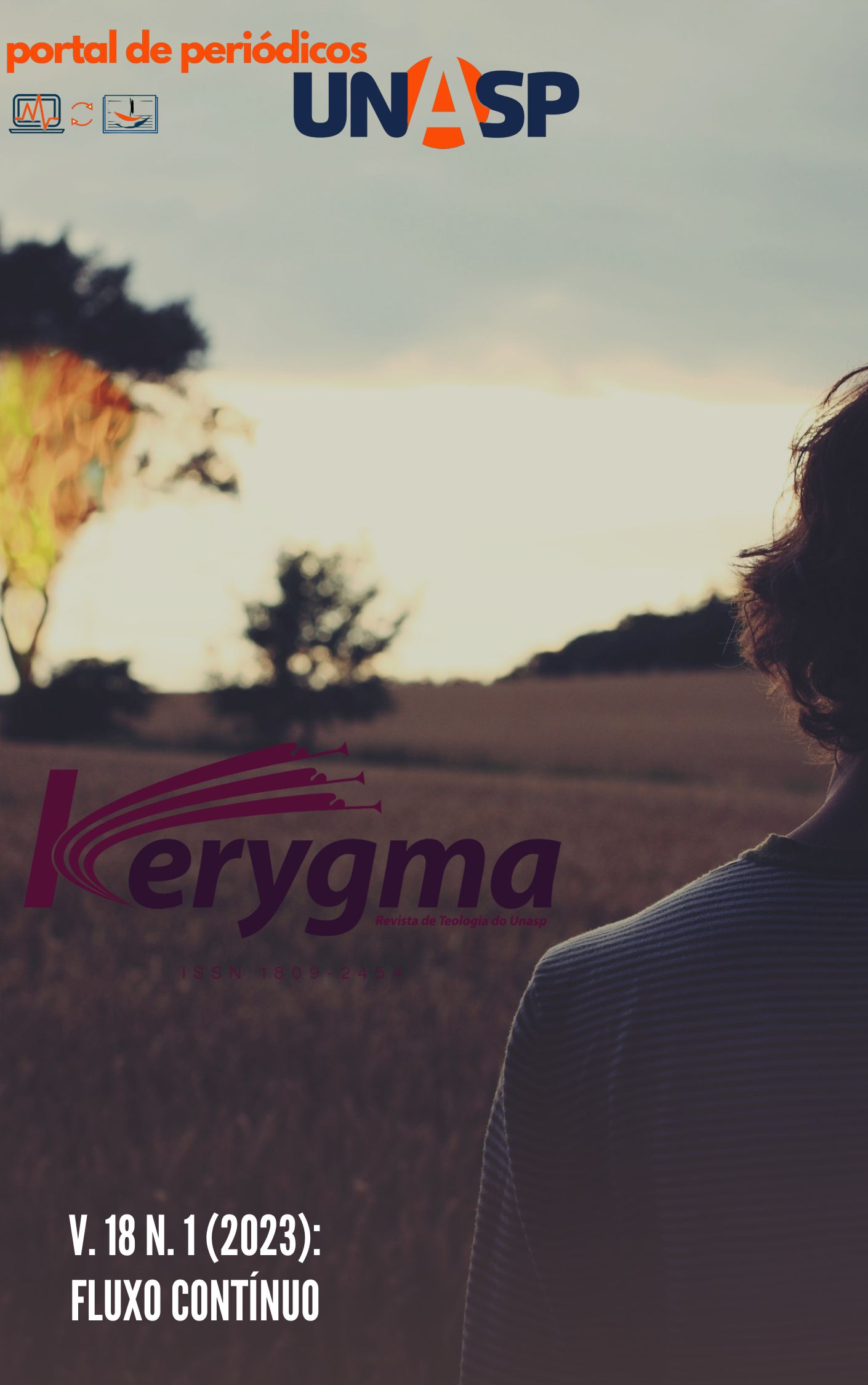“Por que estás fazendo o povo parar de trabalhar?”: a redação do mandamento do shabbat e o clamor dos escravos no Êxodo
DOI:
https://doi.org/10.19141/1809-2454.kerygma.v18.n1.pe1603Palavras-chave:
Descanso, Trabalho, MandamentoResumo
Este trabalho analisará a redação do quarto mandamento do Decálogo, sugerindo a possibilidade deste texto ser uma resposta à pergunta do Faraó em seu diálogo anterior com Moisés: “por que você está fazendo o povo parar de trabalhar?” Para tanto, apresentará pesquisa bibliográfica, apoiando uma breve exegese de duas versões do mandamento, tal como apresentadas nos livros de Êxodo e Deuteronômio, analisando seu contexto histórico e literário. Verificará possíveis motivações para o autor do Êxodo mencionar especificamente o desconforto do Faraó com a cessação das atividades em seu domínio e como a redação do quarto mandamento se contrapõe à cultura vigente em relação à religião e ao sistema socioeconômico baseado na produção e exploração do trabalho.
Downloads
Referências
ANDREASEN, Niels-Erk A. The Old Testament Sabbath: A Tradition-Historical Investigation. Angwin, CA: Society of Biblical Literature, 1972.
ANTONIAZZI, Alberto. Os Dez Mandamentos: várias leituras. Estudos Bíblicos, v.9. Petrópolis: Vozes, 1986.
BACCHIOCCHI, Samuel. Minha Pesquisa sobre o Dia do Senhor. Disponível em: <http://www.verdadeonline.net/textos/odiadosenhor.htm>. Acesso em: 22 outubro. 2022.
BACCHIOCCHI, Samuele. Divine Rest for Human Restlessness: A theological study of the good news of the sabbath for today. Roma: The Pontifical Gregorian University Press, 1980
BAXTER, James Sidlow. Explore the Book. Grand Rapids: Zondervan, 1960.
BLOCK, Peter; BRUEGGEMANN, Walter; MCKNIGHT, John. An Another Kingdom. Hoboken, NJ: John Wiley & Sons, 2016.
BLOOM, Harold. Leio, logo existo. In: Veja, edição 1685. São Paulo, SP: Abril, 31 jan 2001.
BRUEGGEMANN, Walter, Peter Block, John McKnight. An Other Kingdom. Hoboken: John Wiley & Sons, 2016.
BRUEGGEMANN, Walter. Abingdon Old Testament Commentaries Deuteronomy. Nashville, TN: Abingdon Press, 2001.
BRUEGGEMANN, Walter. Sabbath as resistance: saying no to the culture of now. Louisville, KY: Westminster John Knox Press, 2017.
BRUEGGEMANN, Walter. The covenanted self: explorations in law and covenant. Minneapolis: Fortress Press, 1999.
GOTTWALD, Norman. Introdução socioliterária à Bíblia Hebraica. São Paulo, SP: Paulinas, 1988.
GRUEN, Wolfgang. Os dez mandamentos: várias leituras. Editorial. In: Estudos Bíblicos, vol. 9, Petrópolis, RJ: Vozes, 1986
HAMILTON, Victor. Manual do Pentateuco. Rio de Janeiro, RJ: CPAD, 2006.
HASEL, Gerhard. The Sabbath in the Pentateuch. In The Sabbath in Scripture and History. Disponível em <https://digitalcommons.andrews.edu/dissertations/51>. Acesso em 22 de abril de 2022.
HESCHEL, Abraham J. The Sabbath. New York, NY: Harper & Row, 1966.
KRAMER, Pedro. Origem e legislação do Deuteronômio: Programa de suma sociedade sem empobrecidos e excluídos. In: Atualidade Teológica, v. XI, n. 27, 2007. Disponível em https://www.maxwell.vrac.puc-rio.br/18403/18403.PDF. Acesso em 28 nov 2022.
KUNZ, Claiton André. Método histórico-gramatical. In: Via Teológica, Nº 16, vol. 2. Curitiba, PR: FTBP, 2008
MARQUES, Joaquim de Jesus. Literaturas do próximo oriente antigo na Bíblia: Origens, Aliança e Sabedoria. Dissertação de Mestrado, Universidade de Lisboa. Lisboa: 2015.
MERRIL, Eugene. História de Israel no Antigo Testamento: o reino de sacerdotes que Deus colocou entre as nações. Rio de Janeiro, RJ: CPAD, 2001.
NICHOL, Francis (Ed.). Comentário Bíblico Adventista, vol.1. Tatuí, SP: Casa Publicadora Brasileira, 2011.
RATTINI, Kristin. Who was Ramses II? National Geographic. 2019. Disponível em < https://www.nationalgeographic.com/culture/article/ramses-ii >. Acesso em 27 nov 2022.
REIMER, Haroldo. Leis dos tempos jubilares na Bíblia. In: Estudos Bíblicos, vol, 58. Petropólis, RJ: Vozes, 1998
RUBENS, Mario. Gênero literário e o Antigo Testamento. Disponível em https://eclesy.com/genero-literario-e-o-antigo-testamento/#_ftn31. Acesso em 30 nov 2022.
SCHMIDT, Werner. Introdução ao Antigo Testamento. São Leopoldo, RS: Sinodal, 1994.
SCHWANTES, Milton. A origem social dos textos. In: Estudos Bíblicos, v.16. Petrópolis: Vozes, 1988 (1988a).
SCHWANTES, Milton. O Êxodo como evento exemplar. In: Estudos Bíblicos, v. 16. Petrópolis: Vozes, 1988 (1988b).
TRIGGER, Bruce, Barry Kemp, David O’Connor, Alan Lloyd. Ancient Egypt: A Social History. Cambridge: Cambridge University Press, 1983.
VERSIGNASSI, Alexandre. A história real por trás do Êxodo. 18 out 2019. Disponível em < https://super.abril.com.br/especiais/a-historia-real-por-tras-do-exodo/>. Acesso em 27 nov 2022.
VOGT, Peter. Interpretação do Pentateuco: um prático e indispensável manual de exegese. São Paulo, SP: Cultura Cristã, 2015.
WRIGHT, Christopher. Como pregar e ensinar com base no Antigo Testamento. São Paulo, SP: Mundo Cristão, 2016.
ZUCK, Roy. A Interpretação Bíblica. São Paulo, SP: Vida Nova, 1994.
Downloads
Publicado
Como Citar
Edição
Seção
Licença
Copyright (c) 2024 Kerygma

Este trabalho está licenciado sob uma licença Creative Commons Attribution 4.0 International License.
Declaração de direitos autorais
Em síntese, autores que publicam na Kerygma devem concordar que:
-
Após a aceitação, os direitos autorais dos artigos são transferidos à Kerygma.
-
Todo material de terceiros utilizado no texto deve estar corretamente referenciado.
-
Os autores devem possuir autorização para uso de imagens, tabelas e demais materiais gráficos.
-
Os autores asseguram que o texto é original, de sua autoria, e não foi submetido ou publicado em outro veículo.
-
As ideias e opiniões expressas são de responsabilidade exclusiva dos autores, não refletindo necessariamente a posição da revista.
-
Os editores reservam-se o direito de realizar ajustes textuais e adequações às normas editoriais.
-
Os autores mantêm os direitos autorais e concedem à revista o direito de primeira publicação, sob licença Creative Commons Atribuição–Não Comercial 4.0 Internacional.
-
Os autores autorizam a reprodução e adaptação do material pela Kerygma, mediante participação ou autorização expressa quando necessário.
-
A revista poderá distribuir, armazenar, arquivar e disponibilizar os artigos por quaisquer meios físicos ou digitais, gratuitos ou pagos.
-
Os autores podem firmar contratos adicionais para distribuição não exclusiva do trabalho, com menção à publicação original na Kerygma.
-
A reprodução integral ou parcial dos textos em outros meios requer autorização prévia e escrita do editor.
-
Os autores são autorizados e incentivados a divulgar seus trabalhos online antes ou durante o processo editorial, visando ampliar seu impacto acadêmico.














